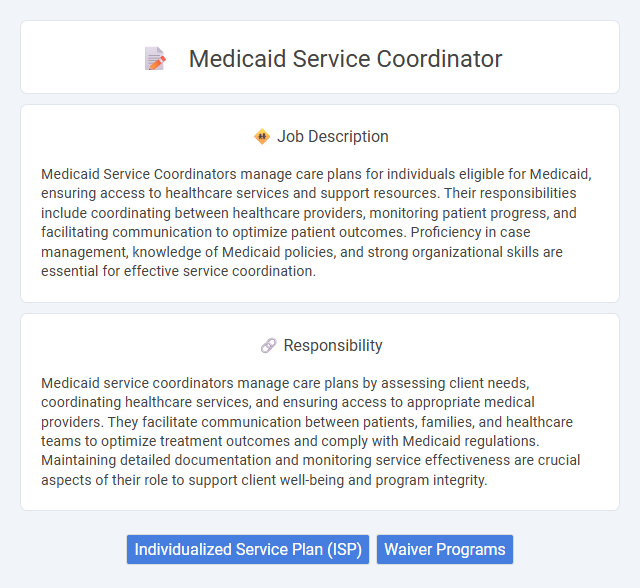
Medicaid Service Coordinators manage care plans for individuals eligible for Medicaid, ensuring access to healthcare services and support resources. Their responsibilities include coordinating between healthcare providers, monitoring patient progress, and facilitating communication to optimize patient outcomes. Proficiency in case management, knowledge of Medicaid policies, and strong organizational skills are essential for effective service coordination.
Individuals with a strong sense of empathy and excellent organizational skills are likely to be well-suited for a Medicaid service coordinator role, as the job involves managing complex care plans for people with various medical and social needs. Those who are comfortable navigating healthcare systems and advocating for vulnerable populations may find this position rewarding and fitting for their skill set. However, individuals who prefer routine tasks without interpersonal challenges might find the demands of coordinating diverse services and addressing urgent client issues less compatible with their work style.
Qualification
A Medicaid Service Coordinator must possess strong knowledge of Medicaid policies, case management, and healthcare regulations to effectively support clients. Essential qualifications include a degree in social work, healthcare administration, or a related field, alongside experience in community resources and care planning. Strong communication skills and the ability to collaborate with healthcare providers and families are critical for optimizing care coordination and improving client outcomes.
Responsibility
Medicaid service coordinators manage care plans by assessing client needs, coordinating healthcare services, and ensuring access to appropriate medical providers. They facilitate communication between patients, families, and healthcare teams to optimize treatment outcomes and comply with Medicaid regulations. Maintaining detailed documentation and monitoring service effectiveness are crucial aspects of their role to support client well-being and program integrity.
Benefit
Medicaid service coordinators likely play a crucial role in connecting individuals with necessary healthcare services, improving access to medical care and support. Their involvement probably enhances the efficiency of care delivery by coordinating multiple providers, reducing redundancies and gaps in treatment. This role generally benefits recipients by promoting better health outcomes and facilitating smoother navigation of complex healthcare systems.
Challenge
Medicaid service coordinator roles likely involve navigating complex healthcare systems and managing diverse client needs, which can present significant challenges. Coordinators probably face difficulties in ensuring timely access to appropriate services while balancing regulatory requirements and limited resources. This job may require strong problem-solving skills and adaptability to handle unpredictable situations effectively.
Career Advancement
Medicaid service coordinator roles offer clear pathways for career advancement through specialization in case management, team leadership, and healthcare administration. Professionals gain valuable experience coordinating complex care plans that improve patient outcomes, positioning them for roles such as senior coordinator or healthcare program manager. Continuous certification and training in Medicaid policies enhance opportunities for promotion within healthcare organizations and government agencies.
Key Terms
Individualized Service Plan (ISP)
Medicaid Service Coordinators play a critical role in developing and managing Individualized Service Plans (ISPs) tailored to the unique needs of individuals receiving Medicaid services. They conduct comprehensive assessments to identify each client's strengths, preferences, and goals, ensuring the ISP aligns with state Medicaid guidelines and promotes optimal health outcomes. Effective coordination involves collaborating with healthcare providers and community resources to implement and monitor the ISP, facilitating access to supports that enhance quality of life and independence.
Waiver Programs
Medicaid service coordinators specializing in Waiver Programs manage individualized care plans for participants, ensuring access to community-based services that promote independence. They coordinate medical, social, and support services while navigating complex Medicaid regulations and provider networks. Expertise in state-specific waiver requirements and documentation is essential for maximizing program benefits and maintaining compliance.
 kuljobs.com
kuljobs.com